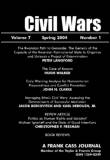Recent research on the causes of civil war seeks to identify whether group grievances, or opportunity for organisation, motivates rebellion. Similarly, scholars debate whether ethnicity matters in civil war due to group grievances or the opportunity to mobilise.
We introduce the lack of empowerment rights, defined as social, political and economic empowerment directly and conditionally in models of civil war onset using novel methods and data. We find no direct effect of repression of rights on war, but higher ethnic fractionalisation increases the risk independently. Nonetheless, higher levels of repression condition the effects of ethnic fractionalisation in ways that maintain peace. State policies that dis-empower people under conditions of high fractionalisation actually reduce the chance of civil war. We do not find that high fractionalisation is only related to lower level armed conflict as some have suggested, but it seems to explain onsets of civil wars above 25 deaths but lower than 1,000 and conflict measured above 1,000 deaths for the period of study that our data allow. The conditional effects of repression and ethnic fractionalisation explain onsets at both levels of war. Our findings are generally unsupportive of the view that grievances due to lack of ethnic group rights drive civil war, but it seems that the opportunity to mobilise does.







